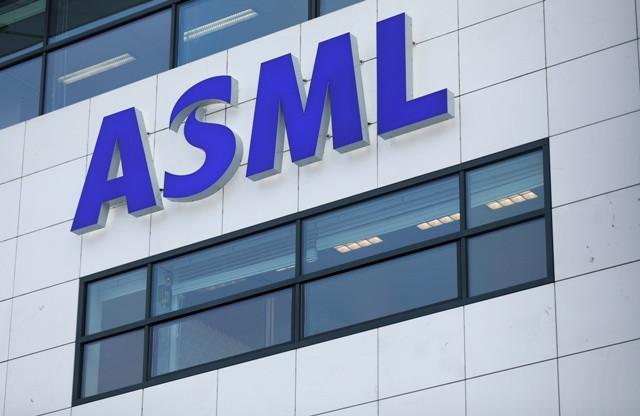ASML, the Dutch semiconductor equipment giant and a key supplier to the world's top chip manufacturers, reported weaker-than-expected first-quarter new bookings on Wednesday, sending shockwaves through the semiconductor industry and dragging down the stocks of major chipmakers. Despite the disappointing bookings, ASML's sales to China remained strong, even in the face of U.S.-led export restrictions aimed at curbing Beijing's military capabilities.
Shares of ASML, which had risen 34% this year, fell 4.5% to 872.50 euros at 1240 GMT following the announcement. The company's new bookings for the first quarter stood at 3.6 billion euros ($3.8 billion), significantly below the 5.4 billion euros expected by analysts polled by Reuters. This news sent ripples through the semiconductor industry, with AMD's stock falling nearly 6%, Nvidia shares dropping over 3%, Intel shares sliding under 2%, and Qualcomm down over 2%. The biggest loser was chip technology firm Arm, which saw its shares plummet nearly 12%.
ASML, which dominates the market for lithography systems - machines that can cost hundreds of millions of euros each and use light beams to help create microscopic circuitry - is gearing up for strong demand in 2025 due to the growing need for AI and memory chips. The company's top customer, TSMC of Taiwan, makes chips for industry giants like Nvidia and Apple. ASML is also poised to benefit from new chip plants planned with government support in Taiwan, South Korea, Japan, and the United States.
Despite the weak bookings, analysts and investors remain optimistic about ASML's long-term prospects, noting that the many plants being built globally will require ASML equipment. "Although disappointing, we would not read too much into it as order intake is notoriously lumpy," said ING analyst Marc Hesselink. However, he added that it would be a problem if new orders didn't come through in the rest of this year.
One bright spot in ASML's earnings report was the strong demand from China, which helped support the company's earnings. Sales of ASML's lithography systems to customers in China made up a record 49% of the total in the first quarter, or around 2 billion euros. This comes as Chinese chipmakers rush to buy older ASML equipment that does not face export restrictions, needed to make chips for products ranging from refrigerators and automobiles to toys and smartphones.
Outgoing ASML CEO Peter Wennink, who is set to retire and be replaced by Christophe Fouquet at the company's annual meeting on April 24, maintained an optimistic outlook despite the weak bookings. He stated that the company still expects a stronger "second half of the year ... in line with the industry's continued recovery," describing 2024 overall as a "transition year."
Wennink also expressed confidence that companies building foundries in the U.S., such as Intel and TSMC, would place more orders for lithography machines later this year. ASML expects government subsidies for chip factories, like the CHIPS Act in the U.S., to boost its sales in the coming years.
Han Dieperink, chief investment officer at investment firm Aureus, which has 5-6% of its 2 billion euro equity portfolio in ASML, said he was not worried by the quarterly numbers, given ASML's market dominance and strong long-term growth outlook. "You can't get around ASML. And that gives us also some sort of defensive qualities," he said.
ASML's first-quarter net income was 1.22 billion euros, down from 2.05 billion in the fourth quarter of 2023. Sales were 5.29 billion euros, down from 7.24 billion euros. The company kept its 2024 financial forecasts unchanged, with sales seen flat from 2023's 27.6 billion euros.






